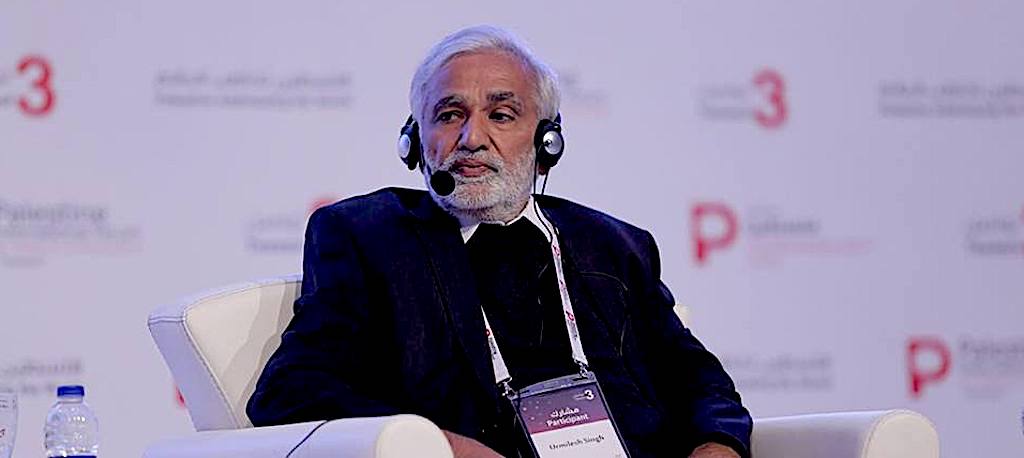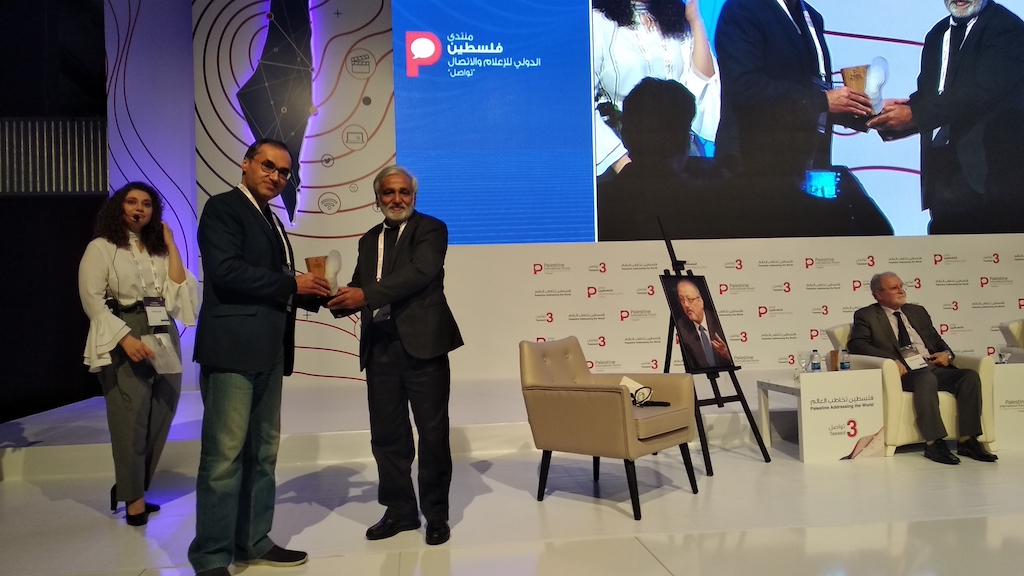BeyondHeadlines Correspondent
“Palestinian issue should not be viewed as merely a Arab-Israeli conflict. It should be viewed more realistically and holistically with broad human angle.”, said Senior Indian journalist Urmilesh Singh in a Conference (Tawasol 3) held in Istanbul.
He said that the media in developing countries and third world are worst affected by the dynamics of market economy and so-called globalisation.
“In the era of ‘globalisation’ they and their journalism have become highly localised. For most of them, Palestinian issue is not of great concern, not a human issue rather there is growing trend to see as merely a crime and localised conflict story, rocket launching, arrests and bombing.”, said Urmilesh on Indian media.
These views were presented by Urmilesh in a panel discussion on the topic, ‘Developing the Global Media Discourse on Palestine’ in a conference organised by Palestine international forum for media.
This conference was attended by journalists, writers, heads of newspapers, radio and television stations, correspondents, photographers as well as several prominent intellectuals and public figures from about 66 countries around the world.
From India, Senior Freelance Journalist Urmilesh Singh; Editor, Strategic Affairs, DNA, Syed Iftikhar Gilani; Newspaper and TV Commentator on Middle East Affair, Saurabh Kumar; Tamil Journalist, Alagarsamy Muthukrishnan; Journalist Aarfa Khanam; Founding members of United Against Hate, Nadeem khan and Khalid saifi; Asia Times Editor, Ashraf Ali Bastavi; General Secretary, IndoPal Foundation, Gauhar Muhammad Iqbal; and BeyondHeadlines Editor, Afroz Alam Sahil attended the conference.
You can read here the important parts of Urmilesh’s speech.
I fully endorse your view that the media should see, report and analyse the Palestinian issue as a human issue. In my view this issue should not be view as merely a Arab-Israeli conflict. It should be viewed more realistically and holistically with broad human angle.
I won’t in details of this issue and it’s historicity as my ten minutes time does not permit it. As a journalist from India, I would like to focus only on media perspective and issues.
We must recognise the fact that after so called globalisation and economic reforms worldwide, the people’s resistance and it’s media coverage ha been negatively affected. Here, I am not ignoring the excellent coverage of these issues by some of the European media groups or individual journalists. But these are very few beautiful exceptions, if you look at global media context.
I can tell you about third world of developing and underdeveloped world, most of media houses in this region are worst affected with the dynamics of market economy and so called globalisation. I can tell you about my country, most of big national and regional media groups and their journalism are worst affected. In the era of ‘globalisation’, they and their journalism have become highly localised. For most of them, Palestinian issue is not of great concern, not a human issue rather there is growing trend to see as merely a crime and localised conflict story, rocket launching, arrests and bombing.
This is reflection of a changed world order after collapse of bipolar global scenario. Second most important factor is globalisation of market economy. I do accept market economy worldwide, has done some good too. But it’s political fallout is not less disastrous.
I strongly feel, media should not be used for interests of ruling elites, corporates and powerful lobbies. It should become voice of oppressed masses and common people. In todays global context, media should stand with democracy, secularism and world piece. But reality is something different. Media in most parts of developing world and in backward nation’s, has become instruments in the hands of wasted interests, ruling classes and elites. It is very surprising that media in developed world like Europe and US, do not hesitate to resist and expose their own ruling elites and Govts. But they don’t do justice as it is needed to the third world, oppressed nation, people of conflict zones and societies like Palestine. Palestinian case is most prominent example of it. If they are more consistent, objective and courageous in the coverage of their respective domestic affairs, why they are not showing same consistency, objectivity and courage in coverage of Palestinian issue or some other issues of human suffering, oppression and subjugation?
We can also see the example of Rohingya in Myanmar where thousands of innocent people have been thrown out from their villages and towns and now living in inhuman condition as stateless.
I think, a global media discourse is need of time how to make media more responsible, democratic, secular and pro people.
While continuing our efforts for a wholistic discourse in mainstream big media houses, we should try to bridge a coordinated and more active fraternal relationship among emerging news portals, alternative Media platforms and relatively smaller media groups which are more democratic and responsive in supporting cause of oppressed nation’s and communities. It does not mean I am advocating to ignore the mainstream big media houses. No not at all!
A global dialogue and consistent discourses are the only way to create a much needed awareness and consciousness among new generation journalists and media professionals. In this process, human rights groups, NGOs and academicians from developed and developing world can contribute a lot. There must be multilateral dialogue process, more of a consistent discourse to create more responsive and pro people media.










